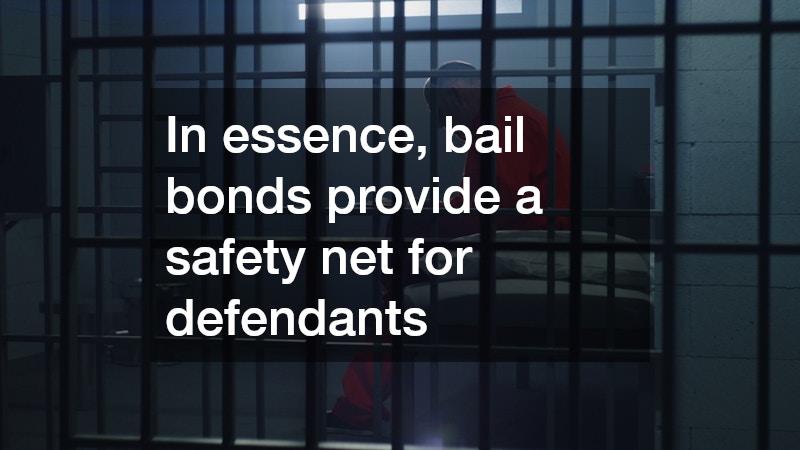How Bail Bonds Work
When a person is arrested, understanding how bail works can be crucial for securing their release. Bail bonds are instruments designed to provide that freedom, but the mechanics can be complex. In this article, we’ll explore how bail bonds work, the role of bail bondsmen, and the implications for defendants and their families.
What Are Bail Bonds?
At their core, bail bonds are financial arrangements that allow a defendant to be released from jail, pending their trial. When a person is arrested, the court sets a bail amount – a sum of money paid to release the accused temporarily.
This serves as assurance that the defendant will appear in court when required. Not everyone can afford to pay the entire bail amount set by the court, which is where a bail bond comes into play. Instead of paying the full amount, a defendant can pay a percentage, generally 10-15%, to a bail bondsman.
Once the defendant pays the percentage fee, the bail bondsman provides the court with a bond that promises the full bail amount if the defendant fails to appear in court. Bail bondsmen are crucial in this process because they make bail more accessible to those who might not afford it otherwise. This business model helps ensure that justice is served while giving defendants a chance to prepare their defense outside jail. Furthermore, it’s important to note that the fee paid to the bail bondsman is non-refundable, even if the defendant is found innocent.
In essence, bail bonds provide a safety net for defendants who would otherwise remain incarcerated pending trial due to financial incapacity. This option is vital; it helps to maintain the balance between the accused’s right to be presumed innocent and the state’s obligation to ensure they attend court. The process, however, involves certain risks, particularly when a defendant decides to forfeit their appearance in court.
The Role of Bail Bondsmen
Bail bondsmen are licensed agents who provide the court with the bond needed for a defendant’s release. These professionals play a critical role by acting as intermediaries between the courts and the defendants. A bail bondsman assesses the likelihood of a defendant attending their court dates based on several factors, including past behavior and criminal history. They also require defendants to provide collateral to secure the bond, which could be a lien on property or other valuable assets. This collateral acts as security against the bond and can be forfeited if the accused skips bail.
In many cases, bail bondsmen work with bounty hunters or private investigators to track down defendants who fail to appear in court. This additional layer of responsibility helps assure the court system that the bail amount will not be lost if the accused decides to flee. By ensuring that people show up for their hearings, bail bondsmen are crucial in maintaining the integrity of the judicial process. It is essential to note that this profession involves substantial risk, particularly when a defendant has no assets to forfeit. In such cases, the bail bondsman takes a financial hit, which could be substantial.
Bail bondsmen not only provide financial assistance but also offer guidance and support to defendants throughout the bail process. They help navigate the often-complex judicial system, providing insights and resources that may otherwise be unavailable to the accused. In serving this function, they become allies to defendants, ensuring they understand their obligations and the importance of meeting them. Thus, whilst they operate for profit, bail bondsmen also assist in the judicial system’s broader mission of justice served efficiently and fairly.
Risks and Responsibilities
The bail bond system is not without its risks and responsibilities for both defendants and bail bondsmen. When a defendant opts for a bail bond, they are agreeing to attend all court proceedings. Failure to meet these obligations results in financial penalties and further legal complications. The bail bondsman, on their part, takes a calculated risk that the defendant will adhere to the legal requirements. If not, they stand to lose a significant portion of their business revenue and face the challenge of recovering costs.
The defendant must also be aware that opting for a bail bond requires collateral. If they skip any court appearances, not only do they risk legal consequences, but their assets can also be at stake. Therefore, it adds a layer of pressure on the accused to prioritize fulfilling their legal obligations. In certain jurisdictions, mechanisms exist to revoke bail if a judge believes that the defendant poses a flight risk. Understanding these clauses is imperative for all parties involved to avoid unintended complications.
With these complexities in mind, defendants should ensure that they engage with reputable bail bondsmen who can provide transparency and legally compliant services. This degree of due diligence ensures that the process remains as seamless as possible and reduces undue stress on the defendant and their loved ones. Therefore, the decision to work with a bail bondsman is profound and needs careful consideration. Ultimately, understanding the responsibilities and risks associated can better prepare defendants for the journey ahead while providing the courts with much-needed assurance on the integrity of the bail system.

